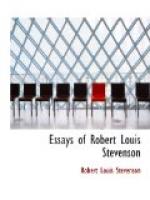He was not primarily a moral teacher, like Socrates or Thomas Carlyle; nor did he feel within him the voice of a prophetic mission. The virtue of his writings consists in their wholesome ethical quality, in their solid health. Fresh air is often better for the soul than the swinging of the priest’s censer. At a time when the school of Zola was at its climax, Stevenson opened the windows and let in the pleasant breeze. For the morbid and unhealthy period of adolescence, his books are more healthful than many serious moral works. He purges the mind of uncleanness, just as he purged contemporary fiction.
As Stevenson’s correspondence with his friends like Sidney Colvin and William Archer reveals the social side of his nature, so his correspondence with the Unseen Power in which he believed shows that his character was essentially religious. A man’s letters are often a truer picture of his mind than a photograph; and when these epistles are directed not to men and women, but to the Supreme Intelligence, they form a real revelation of their writer’s heart. Nothing betrays the personality of a man more clearly than his prayers, and the following petition that Stevenson composed for the use of his household at Vailima, bears the stamp of its author.
“At Morning. The day returns and brings us the petty round of irritating concerns and duties. Help us to play the man, help us to perform them with laughter and kind faces, let cheerfulness abound with industry. Give us to go blithely on our business all this day, bring us to our resting beds weary and content and undishonoured, and grant us in the end the gift of sleep.”
III
STEVENSON’S VERSATILITY
Stevenson was a poet, a dramatist, an essayist, and a novelist, besides writing many political, geographical, and biographical sketches. As a poet, his fame is steadily waning. The tendency at first was to rank him too high, owing to the undeniable charm of many of the poems in the Child’s Garden of Verses. The child’s view of the world, as set forth in these songs, is often originally and gracefully expressed; but there is little in Stevenson’s poetry that is of permanent value, and it is probable that most of it will be forgotten. This fact is in a way a tribute to his genius; for his greatness as a prose writer has simply eclipsed his reputation as a poet.
His plays were failures. They illustrate the familiar truth that a man may have positive genius as a dramatic writer, and yet fail as a dramatist. There are laws that govern the stage which must be obeyed; play-writing is a great art in itself, entirely distinct from literary composition. Even Browning, the most intensely dramatic poet of the nineteenth century, was not nearly so successful in his dramas as in his dramatic lyrics and romances.




